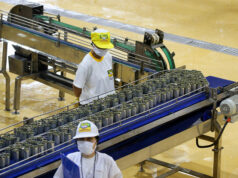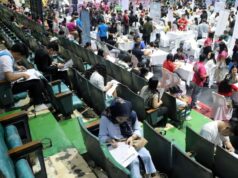PHL to open up economy as lockdown eases
By Jenina P. Ibañez and Genshen L. Espedido, Reporters
and Adam J. Ang
THE Philippines will allow nearly all economic sectors to resume operations, as the country relaxes one of the world’s longest and strictest lockdown restrictions on June 1.
The government on Thursday night said it will place under general community quarantine (GCQ) the National Capital Region, Cagayan Valley, Central Luzon, Calabarzon, the provinces of Pangasinan, and Albay, and Davao City. The rest of the country will be under a modified GCQ.
Most businesses will be allowed to operate at 50% up to full capacity in areas under GCQ, a move that the government hopes will jumpstart the economy’s recovery as it faces a recession.
“Practically, almost all industries, all sectors will be open except for the few exception(s),” Trade Secretary Ramon M. Lopez said in a television interview on Friday.
Under Inter-Agency Task Force for the Management of Emerging Infectious Diseases (IATF) guidelines, industries including utilities, agri-fishery and forestry, food manufacturing and supply chain, groceries, food take-out and delivery, logistics, health, information technology and telecommunications, and media may operate at full capacity under the GCQ.
Some industries can operate between 50% to full capacity, including mining and manufacturing, e-commerce, delivery, repair, and housing and office services.
Industries that can operate at 50% capacity include financial services, legal and accounting, auditing, professional, scientific, and technical services, non-leisure establishments, as well as wholesale and retail establishments.
Companies under these industries may continue to have work-from-home and other alternative work arrangements.
Shopping malls may have limited operations, excluding leisure establishments and services.
Some public transportation, including road, rail, maritime, and aviation may operate at limited capacities, with one-meter distance between passengers.
The Transportation department said trains, point-to-point buses, shuttle services, taxis, tricycles, bicycles and transport network vehicle services (TNVS) can operate during Phase 1 covering June 1-21. No provincial buses will be allowed to enter Metro Manila. For Phase 2 that starts June 22, public utility buses, modern public utility vehicles and UV Express will be allowed to operate.
Flag carrier Philippine Airlines (PAL) and budget airline Philippines AirAsia, Inc. said they will resume commercial operations on June 1. They are currently coordinating with the government regarding its guidelines in allowing air travel and reopening of airports.
“We are currently checking with aviation authorities and respective LGUs (local government units) for their own guidelines regarding the opening of local airports, as some may still be closed in June,” AirAsia said in an advisory, Friday.
“PAL is closely coordinating with local and national government authorities on the necessary implementing rules and arrangements to finalize our routes and flight schedules,” PAL said on Wednesday.
The Transportation department also said it will reopen the international gateways in Clark, Cebu, and Davao to decongest the Ninoy Aquino International Airport (NAIA). Airports in Zamboanga, Iloilo, Bacolod, and Bohol are also eyed for reopening.
Domestic flights will only be allowed between areas under GCQ.
SOME RESTRICTIONS REMAIN
However, amusement, gaming and fitness establishments as well as industries catering to children and tourism may still not operate under GCQ. Concerts, sporting events, community assemblies, and non-essential work gatherings are not allowed.
Hotels may operate only if they are accommodating existing bookings from foreigners as of March 17, 2020 for Luzon and May 1 for others, guests with existing long-term bookings, repatriated overseas Filipino workers (OFW), stranded Filipinos or foreign nationals, non-OFWs that are required to be in quarantine, healthcare workers and employees from operating establishments.
Only basic accommodation services in hotels will be allowed to operate, while added services like gyms and spas may not operate.
RESTAURANTS TO REOPEN?
Meanwhile, the Department of Trade and Industry (DTI) on Friday recommended a gradual reopening of restaurants with dine-in services in areas under GCQ.
Trade and Industry Undersecretary Ruth B. Castelo said Mr. Lopez is recommending the gradual reopening of restaurants during the GCQ, but “only those who can comply with the DTI-issued protocols can resume operations.”
In a presentation before the House committee on trade and industry, Ms. Castelo said DTI-issued protocols include the enforcement of a “no mask, no entry” policy, social distancing protocols, regular sanitation, availability of non-contact modes of payment, and mandatory wearing of personal protective equipment for employees, among others.
While dine-services are recommended, Ms. Castelo said that the DTI “highly discourages” buffets and salad bars.
She added that all operations are subject to post-audit from the DTI, Department of Labor and Employment, Department of Tourism and respective local government health offices.
“We can do random inspections, as we normally do and we will recommend the closure of business establishments that do not comply with health protocols imposed by the government,” Ms. Castelo said.
FURTHER EASING UNDER MGCQ
As the rest of the country shifts to a modified general community quarantine (MGCQ), all industries will be allowed to operate. Only some service-oriented sectors will continue operating at a limited capacity.
“Sa GCQ, they (service sector) are not yet allowed but we’re finding ways especially if they are able to strengthen ‘yung minimum health protocol that they can institute to limit the transmission (of COVID-19)… kailangan ma-address ‘yung concerns na ‘yun so that we can consider reopening them earlier, even under GCQ,” Mr. Lopez said.
“We want to really bring back more jobs back to work,” he added.
Mr. Lopez said that barbershops, gyms, cinemas, and personal care services may operate with 50% capacity under the MGCQ.
The MGCQ is the most relaxed form of the lockdown designed to address the coronavirus outbreak.
When the areas shift to MGCQ, places of worship like churches may also operate up to 50% capacity. Other businesses that will be reopened at limited capacity under this relaxed lockdown measure include sports facilities, theaters, bars, libraries, museums, tourist destinations, and travel agencies.



